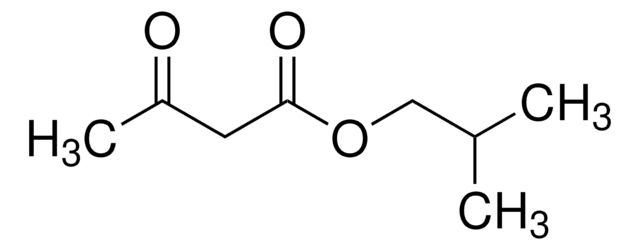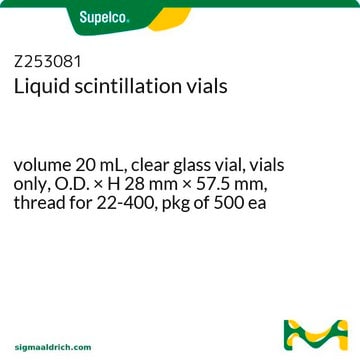Recommended Products
Analysis Note
- Volume size: 10.0 ml
- Background: < 30 cpm
- Counting efficiency (tSIE, 3H Eff.): >590 (>51.0%)
- Maximum capacity at 20°C (above these limits gel formation occurrs):
0.1 M PBS buffer: 1.60 ml
Signal Word
Danger
Hazard Statements
Precautionary Statements
Hazard Classifications
Acute Tox. 4 Oral - Aquatic Chronic 1 - Asp. Tox. 1 - Eye Dam. 1 - Flam. Liq. 3
Storage Class Code
3 - Flammable liquids
WGK
WGK 3
Flash Point(F)
109.4 °F - closed cup
Flash Point(C)
43 °C - closed cup
Personal Protective Equipment
dust mask type N95 (US), Eyeshields, Gloves
Regulatory Listings
Regulatory Listings are mainly provided for chemical products. Only limited information can be provided here for non-chemical products. No entry means none of the components are listed. It is the user’s obligation to ensure the safe and legal use of the product.
EU REACH SVHC Candidate List
CAS No.
EU REACH Annex XVII (Restriction List)
CAS No.
EU REACH Annex XIV (Authorisation List)
CAS No.
Choose from one of the most recent versions:
Already Own This Product?
Find documentation for the products that you have recently purchased in the Document Library.
Customers Also Viewed
M Kaneda et al.
Journal of experimental botany, 62(6), 2063-2077 (2011-01-18)
The primary inflorescence stem of Arabidopsis thaliana is rich in lignified cell walls, in both vascular bundles and interfascicular fibres. Previous gene expression studies demonstrated a correlation between expression of phenylpropanoid biosynthetic genes and a subset of genes encoding ATP-binding
Shuchen Gu et al.
Molecular cancer, 8, 114-114 (2009-12-02)
Membrane androgen receptors (mAR) have been implicated in the regulation of cell growth, motility and apoptosis in prostate and breast cancer. Here we analyzed mAR expression and function in colon cancer. Using fluorescent mAR ligands we showed specific membrane staining
Our team of scientists has experience in all areas of research including Life Science, Material Science, Chemical Synthesis, Chromatography, Analytical and many others.
Contact Technical Service
















